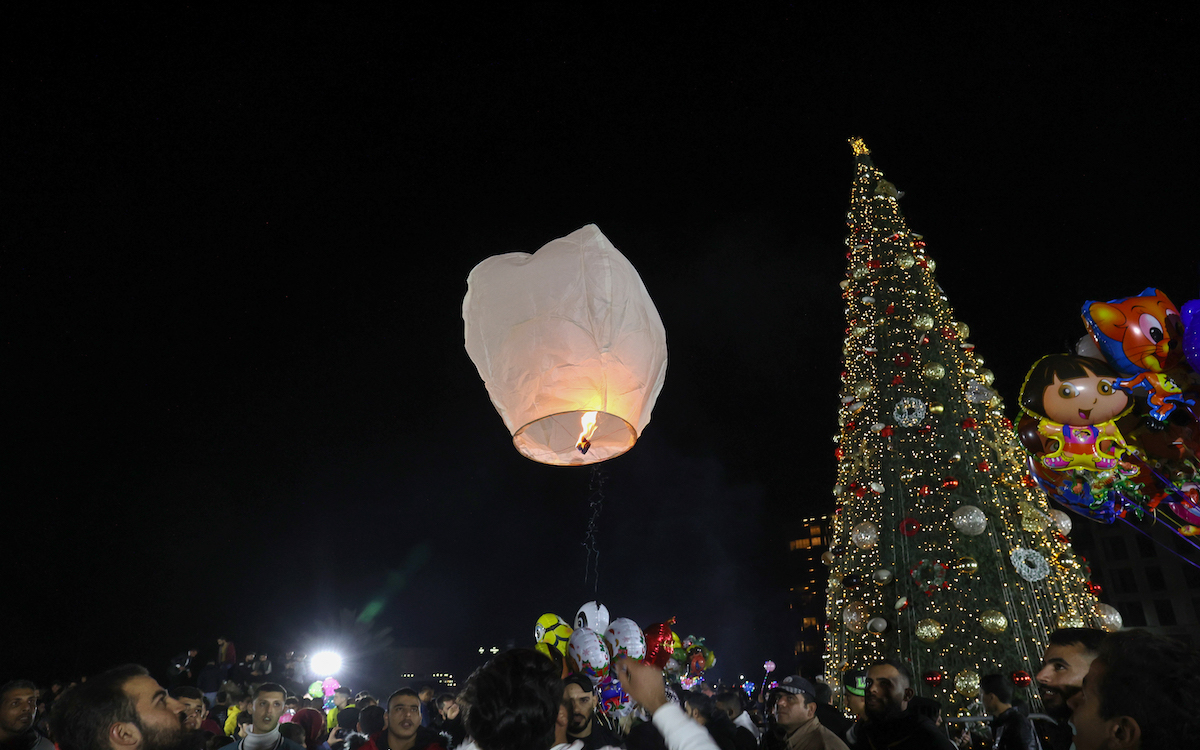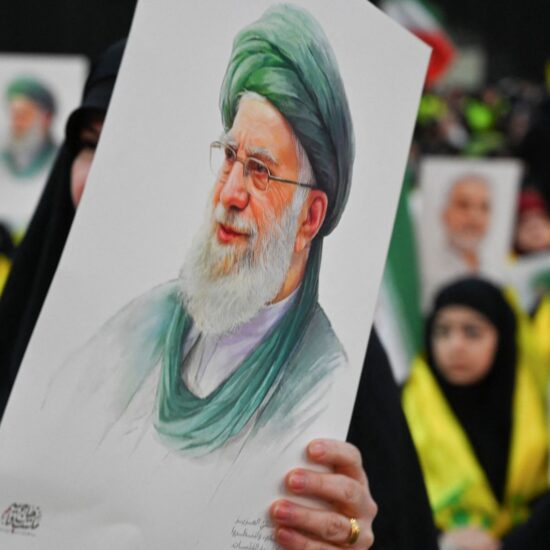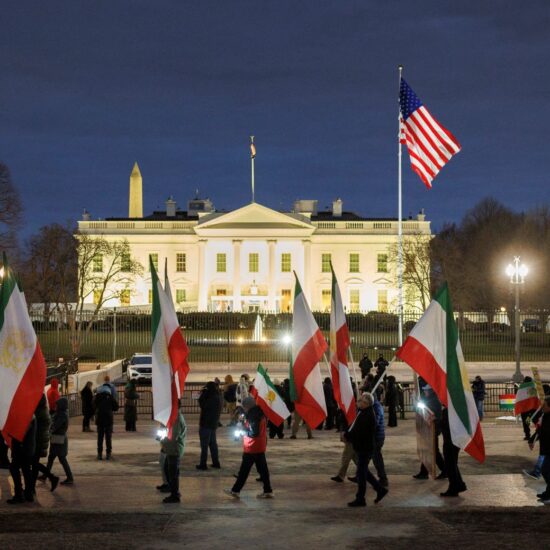
The world welcomed the new year on Sunday with confetti, fireworks and deafening cheers.
Lebanon being Lebanon added another element: bullets.
In Lebanon, people will shoot in the air to celebrate a wide range of achievements and important moments ranging from engagements, weddings, funerals, to children taking exams, children passing exams, cheering on a political leader’s victory, mourning a political leader’s loss and so much more.
As one would expect, surviving another year falls under this list of reasons to break out the Kalashnikov and shoot in the air.
Every year stray bullets strike peoples’ homes, cars and, unfortunately, their bodies, sometimes killing the unsuspecting celebrator or bystander.
Thankfully, this year, there were no reports of people getting killed by stray bullets.
However, the Beirut airport did see two planes from Lebanon’s national airline, Middle East Airlines, struck by falling bullets. No one was injured and there was only minor damage to the parked airplanes, which are now undergoing repairs.
One bystander near the airport had a brush with death, though, as a falling bullet reportedly missed them and struck their phone instead.
Reportedly, a stray bullet impacted the phone of a local at the airport too.
He/she was not injured. pic.twitter.com/qlevTsV3Sg
— Lebanese News and Updates (@LebUpdate) January 1, 2023
Some things never change and celebratory shootings in Lebanon, despite the economic crisis and cost of bullets, is one of those things that seems like it is here to stay.
In Lebanon
A prolonged crisis: Lebanon has been without a president for over two months, as Parliament has repeatedly failed to elect a new head of state.
Now, according to Progressive Socialist Party MP Marwan Hamadeh, the country is likely to be without a president for much longer.
Hamadeh expressed little optimism that a new president would be elected any time soon, noting the inability for politicians to agree on a candidate, and that the discussions held in order to come to a consensus on a candidate have gotten nowhere.
The MP also criticized Free Patriotic Movement leader Gebran Bassil after he spoke with PSP head Walid Joumblatt, arguing that Bassil’s meeting had little to do with electing an effective president and more to do with continuing the FPM’s control over the presidency.
In addition to his criticism of Bassil and the FPM, Hamadeh also argued for the need for a strong president that would confront Hezbollah, despite that, in reality, no president that would stand up to Hezbollah would ever be elected. He also expressed his support for the possibility of an international conference that would, hopefully, see the international community agree on a candidate which would, in turn, help bring the political vacuum to an end.
Parliament is still on holiday and no new sessions to elect a president have been called yet.
Exodus: The “change” party Citizens in a State (MMFD) saw mass resignations last week in a surprising and significant blow to the party.
There were several reasons given for the resignations, some of which stemmed from criticisms towards the party’s leader, Charbel Nahas, who could allegedly nominate himself to be head of the party, practically ensuring that he would lead MMFD for as long as he wanted. Some also claimed that MMFD was straying from their founding principles and was increasingly becoming like the ruling establishment parties that they have said they are against.
In the build-up to the May 15 parliamentary elections, MMFD was considered to be one of the strongest parties running and were expected to do well in the elections. However, when the elections finally came and went, this appeared to be all perception as MMFD failed to secure even one seat in Parliament.
The future of MMFD is now unclear, but its reputation as a serious “change” party is in tatters.
Migrant ship sinks: As Lebanon’s economic crisis has continued to worsen, an increasing number of people have attempted to flee the country by boat despite the deadly risks that such trips pose..
Even though there have been several high-profile boats that have sunk, including one in April 2022 and another in September 2022, people continue to attempt the journey and sometimes have to be rescued.
This happened on Saturday, December 31, when two Lebanese military ships and one UNIFIL ship came to the aid of a vessel carrying over 200 migrants after it sank off Lebanon’s northern coast. Two of the migrants, a Syrian woman and a Syrian child, died.
As long as the crisis continues and people are left with few options, there will likely only continue to be news of migrants attempting to escape by boat.
Killer in custody: A suspect in the killing of a UNIFIL soldier in south Lebanon last month was apprehended by the Lebanese army on Tuesday, December 27.
The UNIFIL soldier, Seán Rooney, was killed after his convoy entered al-Aaqabiya, a village in the Hezbollah stronghold of south Lebanon, and then came under fire, killing him and wounding others.
According to Hezbollah, the suspect in the shooting was apprehended with the group’s help.
No details about the suspect have been released yet.
Temporary measures: Lebanon’s Central Bank announced that it was slashing the value of the lira to 38,000 on the Bank’s Sayrafa exchange platform after the lira hit new record lows against the dollar.
After the new rate was announced, the Central Bank said that it was opening trading for all individuals and institutions at the new rate and that it was lifting a $400 monthly withdrawal limit. The value of the lira on the black market immediately began to appreciate rapidly, going from around 47,000 to $1 to around 42,000.
While this succeeded in helping the ailing lira in the short term, these gains will be short-lived as the market eventually corrects itself and the black market rate once again increases along with inflation.
Without any reforms, 2023 will likely only see the lira devalue even further against the dollar.
Questions arise over Nasrallah’s health: Last Friday, December 30, Hezbollah’s secretary-general, Hassan Nasrallah, was scheduled to give his final speech of the year where he would discuss recent political developments.
The speech, though, was canceled last minute due to health reasons. According to Hezbollah’s media department, Nasrallah had contracted the flu but would still speak on the anniversary of the deaths of Iranian Quds Force leader Qassem Soleimani and Iraqi Popular Mobilization Force deputy Abu Mahdi al-Muhandis.
#Hezbollah, in a statement, says that the planned speech for today by the group’s secretary-general, Hassan Nasrallah, has been canceled due to health reasons after Nasrallah contracted the flu. #حزب_الله
— Nicholas Frakes | نيكولاس فريكس (@nicfrakesjourno) December 30, 2022
Since then, there have been further reports in Israeli and Saudi-backed news outlets that Nasrallah was in urgent care at a hospital after suffering a stroke.
However, in attempting to verify these reports, NOW could not find anything to support the claims that Nasrallah had been hospitalized. Should Nasrallah also fail to appear for the anniversary of Soleimani and al-Muhandis’s deaths, it will likely only fuel speculation over the Hezbollah leader’s health.
In the region
New year, new killings: Two Palestinian men were shot and killed by Israeli forces near the West Bank city of Jenin early Monday morning after Israeli troops entered the area.
Reportedly, Israeli forces were in the area to demolish the homes of two Palestinian gunmen who were killed in September.
2022 was the deadliest year for Palestinians since 2005, with well over 150 Palestinians killed by Israeli forces.
Tensions remain high as Israeli forces continue to perform almost daily raids in the West Bank and as a new right-wing government has been sworn into office.
Netanyahu returns: Former Israeli Prime Minister Benjamin Netanyahu was sworn into office for a sixth time on December 29 following around 18 months in the opposition when he was ousted as the country’s leader.
Netanyahu’s return also saw the most right-wing government in Israel’s history come to power, creating worries within both Israeli and Palestinian societies as to what will happen next.
The prime minister insists that he will be the one in charge of the government, but this has been called into question, given how many ministries and positions he had to give to his far-right allies in order to successfully form a government.
New year, same old story: In its first airstrike on Syria of the year, Israel temporarily put Damascus International Airport out of service.
This strike comes six months after the same airport was shut down for two weeks, also because of Israeli airstrikes.
Israel rarely confirms its strikes on Syria, but has insisted that any actions that they take in Syria are meant to counter Iran and Hezbollah, particularly the transfer of Iranian weapons to Hezbollah in Lebanon.
An unexpected meeting: Syrian, Turkish and Russian officials met in Moscow recently in a surprise meeting to discuss the situation in northern Syria.
The meeting between the three countries’ defense ministers also marked the first ministerial-level meeting between Syrian and Turkey since the start of the civil war in 2011 in which Turkey backed the rebel forces.
Few details have been released about the meeting.
According to Turkey’s defense ministry, they will continue holding these three-way meetings.
Oil workers attacked in Syria: A convoy of buses carrying oil workers in eastern Syria was attacked, killing at least 10 people.
No group has taken credit for the attack, but ISIS has been increasingly active in eastern Syria and has previously attacked convoys in the area carrying soldiers.
This attack came a day after the Pentagon announced that nearly 700 ISIS suspects had been killed in Iraq and Syria in 2022 by the US and US-allied forces.
While losing all of its territory in 2019, ISIS has remained active and continues to carry out attacks and assassinations.
What we’re reading
Fuel shortages: Syria has been in the midst of its own economic crisis, leading to fuel shortages. David Isaly found that while there are fears that this will spill over into neighboring Lebanon, this will only affect the small Mediterranean country in the short term and Syria will eventually emerge from this crisis.
Staking claim: When Palestinians are killed by Israeli forces, they are often claimed by the various groups fighting against Israel’s occupation of Palestine. However, the New York Times’s Raja Abdulrahim and Hiba Yazbek looked into the claiming of martyrs by Palestinian groups and found that they are not always affiliated with the groups that claim them as their own.
Lebanon+
Pelé in Lebanon: With the passing of the Brazilian football great Pelé on December 29, many Lebanese fans took to social media to remember the player and the time that he visited Lebanon just before the start of the Lebanese Civil War in 1975.
King #Pele in #Beirut, #Lebanon for a friendly match in 1975, donning the uniform of @Nejmeh_SC — the country’s most iconic football club. Legend has it that his presence in #Lebanon postponed the outbreak of the infamous 15yr Lebanese civil war, a few days.
Rest in peace GOAT. pic.twitter.com/Gdx7DNqOI0— Bachar EL-Halabi | بشار الحلبي (@Bacharelhalabi) December 29, 2022
Until next week, follow NOW Lebanon on Twitter, Instagram, Facebook, and LinkedIn, and subscribe to our weekly newsletter. And stay safe!








